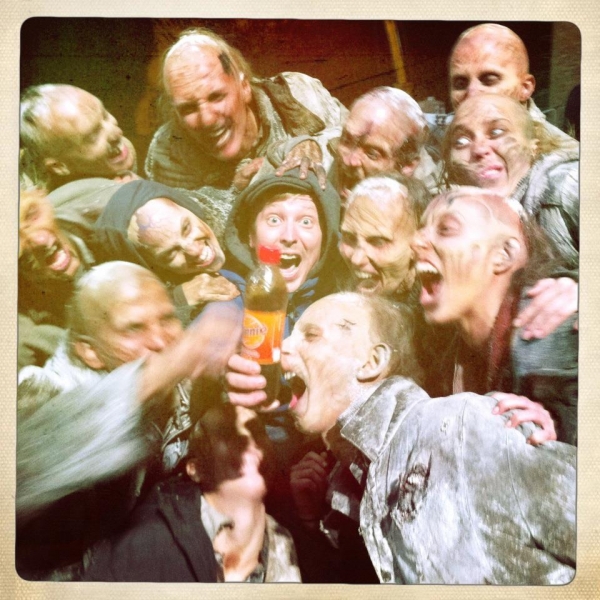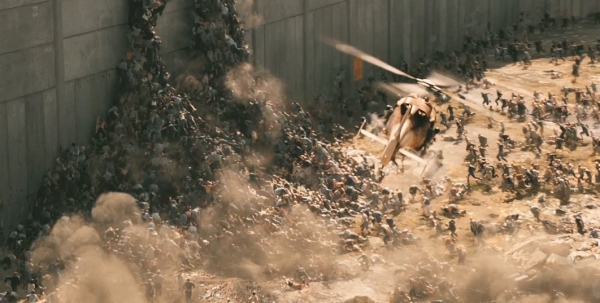Q&A with Tom Rye, 2nd Assistant Director
Tom Rye, 2nd Assistant Director - World War Z

Tom Rye is a 2nd Assistant Director working in Feature Films in the UK. With a lengthy career across film and drama, we asked about 2 of his most recent credits which are both released in June. The epic Brad Pitt movie, World War Z and Spike Island, about the fabled Stone Roses gig in 1990.
World War Z is out on Friday (21st). What is it about and why is it different to other zombie films?
The story is basically a look at what would happen if an outbreak of an unknown virus were to occur. How quickly it could spread, and what the outcome of such a vicious virus attack would be.
We were told early on to forget all we’d ever seen or read about “Zombies”.
Throughout the job we referred to them as Z’s. The word Zombie was rarely used, as we wanted to make something that had never been seen before, so whilst we made the film we didn’t think of them as Zombies, more as virus carriers.
The thought process behind this was to separate our thoughts from what’s come before. We’ve seen the slow moving, moaning Zombies with outstretched arms, and in more recent Zombie films we’ve seen fast running Zombies. In both of those forms there was one main goal; to kill and feed on human flesh.
Our Z’s are not out to eat their prey. They want to bite, pass on the ‘virus’ and move on to their next human. They work in packs, like wolves.
Their goal is to kill off our species, and therefore ending our world as we know it.
Where is the film set and where did you end up shooting?
The film starts off in the calms of rural Philadelphia and quickly moves us into the City Centre. Amazingly we changed George Square in Glasgow into Philly. We took over the centre of the city for 2 weeks creating fantastic on-screen chaos.
The film then moves out to Newark, which we managed to shoot in Uxbridge and in Elstree Studios.
Next the film takes us to an aircraft carrier, which we filmed in Falmouth. It was a huge deal to set it up as you’ll see in the film.
From there the movie takes us to Korea, or as we like to call it, Dunsfold Aerodrome in Surrey (where they film Top Gear). We also filmed a number of aeroplane shots there.
Then, the big location, Malta, which was doubling for Israel. This was quite early on in the shoot and was the biggest operation I’ve seen. You’ll have seen in the trailer the clips where the Z’s are climbing up a wall like an Ant Hill. That was Malta.
Then we came back to the UK and did a lot of filming at Longcross Studios.
Eventually we ended up in Budapest to shoot the end of the film. It was set to double for Russia but that ending changed in rewrites and reshoots.
When we came back to shoot an alternative ending we shot mainly at Shepperton Studios with a few 2nd Unit arial shots in Wales.

What was the most challenging aspect for you when shooting World War Z?
I was heavily involved with the Zs. They were the main part of my job. It took everyone a while to make a final decision on how they wanted the Z’s to move, how far could we push the boundaries with movement and their look without taking it too far from the realms of reality?
We had Zombie School for movement specialists to come and learn the ‘language’ of the Z. How they moved, how they would act when in a dormant state and how they can change from that to an almost rabid dog-like state in a nano-second.
All of that took time and patience and hours in make up and costume. In Malta for example, we had a core group of 20 Z’s, who’d be in make up at 4am and leave set after they’d been de-rigged at 10pm, then back in the next day at the same time. It was hard, but after seeing the final product, well worth it.
You work very closely with the on-screen talent in your role, who have enjoyed working with in particular?
Of course they are all a delight to work with (I have to say that or I’ll never work again). On this particular job they were all well behaved. Mr Pitt was the boss. As the producer and the lead it meant everyone had to behave with him around.
As I said before, my main role on this was to keep the Z’s happy. They were in heavy prosthetic make up and were making their bodies do amazing things physically, so they needed a lot of looking after. I had some great PAs to help keep them happy.
As well as WWZ, Spike Island is also out this month – what can you tell us about that film?
I’m of the age where the Stone Roses were my Beatles. I’d never heard anything like them before and they spurned a lot of my favourite bands from their music. Oasis formed at the Spike Island gig, it was the UK’s Woodstock.
It was a tight budget and the complete polar opposite of WWZ when it came to money, but that made me enjoy it even more. Finding people in Manchester to be in a film which centres on The Stone Roses was pretty easy; they’re considered gods up there.
If you could recommend any film or TV show from your CV for our readers to watch – what would you pick and why?
That’s a tricky question. I think I’d have to go for The Red Riding Trilogy. It really was ground-breaking television. The amazing thing is that on pretty much any job I’ve worked on since, I’ve overheard the producers / directors / writers refer to ‘Red Riding’. It’s used as reference material for so many films / TV Productions since. If you’ve not seen it, do so.
What was your first taste of the industry and how did you get into the AD department?
Quite simply….nepotism.
I grew up on film / television sets. My father, Renny Rye is a director and often as a child we would visit him on set.
My first taste of the industry was when we had to do two weeks' work experience at secondary school. Whilst my friends were working at Budgens for 2 weeks or at their uncles' accountants, I got to work on Dennis Potters ‘Lipstick On Your Collar’ as a 15-year-old work experience runner.
On day 1 they handed me my radio and told me to lock off behind a door. I remained there for days, and I loved it! From that day on I knew I wanted to be an AD.
What has been your best day at work?
That’s a hard one. Some days are absolutely horrendous, everything seems to go wrong during the day, and you’re constantly fixing problems, which are not of your doing and above your pay grade. Then the filming day ends and you leave thoroughly p*ssed off. Then when you get home you realise what a huge day you’ve just achieved and maybe what you thought was a bad day, was actually a brilliant one.
It’s hard to single out one particular day. There are plenty, but I’m sure my best day is yet to come!
If you could pass on any advice to aspiring ADs, what would you say?
No matter where you start, aim high and stick to those principles. I started on a soap opera and always said I wanted to work on feature films. I then moved up to TV Drama and eventually after years of doing major TV, I made a conscious decision I wanted to do films. So I did what goes against every freelancer’s instinct when unemployed; I turned down the first offer of work I got (it was a TV Drama). Two weeks passed and I had the feeling of ‘never working again’ doom.
Then the phone rang and it was the Production Manager from Warhorse. Needless to say I’ve never looked back.
I’ve nothing against smaller projects at all. In fact they are often more enjoyable to work on, and I’m sure I will work on them again. But I made a decision and stuck to it.
Aim high.
If you could have chosen another career, what you have done?
Something music related. I’ve DJ’d on and off since I was 17 and even produced my own dance tracks. It’s definitley a route I could have gone down if I hadn’t chosen being an AD.
If you could change one thing about the film industry, what would you do?
Being paid for work / hours done. As an AD we’re often first in and last to leave yet we’re not always paid for any time outside of ‘shooting hours’.
It’s something that needs looking at and hopefully will be addressed across the board for all crew members soon.
If you ever get any time off, how do you relax?
I have recently moved out of London to make sure time off is quality time off with my family.
With 2 young children and another one the way I wouldn’t say relaxing is something I get much time to do.
If you could work with anyone (living or dead) and that you haven’t already, who would it be?
J.J Abrams and the ADs from Star Wars 7 (hint, hint) haha!
Take a look at Tom's profile page here
thecallsheet.co.uk has over 4000 members including Oscar, Bafta and Emmy award winning talent, all in a database of over 50,000 people, productions and companies.
We individually approve every account for sufficient experience - why not read more about us on our testimonial page.